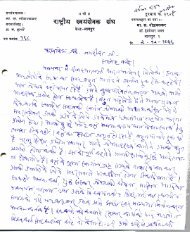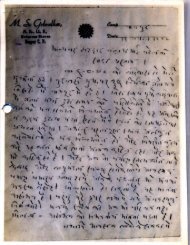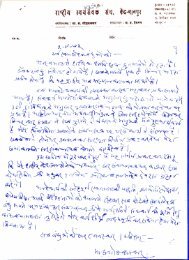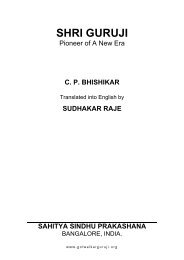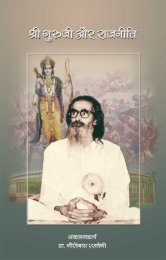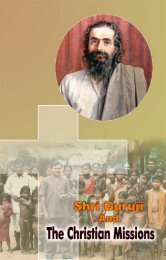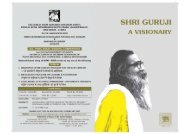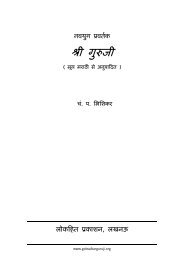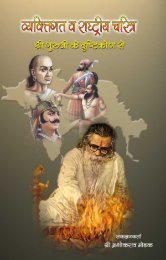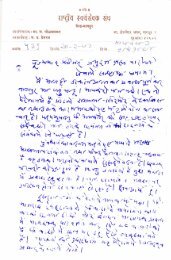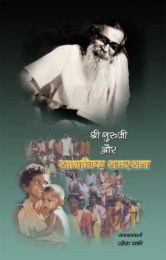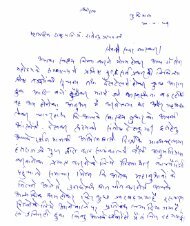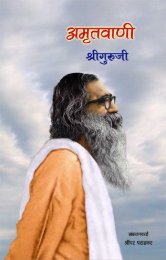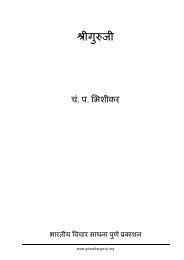Shri Guruji and Indian Muslim.pdf - Shri Golwalkar Guruji
Shri Guruji and Indian Muslim.pdf - Shri Golwalkar Guruji
Shri Guruji and Indian Muslim.pdf - Shri Golwalkar Guruji
You also want an ePaper? Increase the reach of your titles
YUMPU automatically turns print PDFs into web optimized ePapers that Google loves.
Chapter - V<br />
Two Nation mentality<br />
The country’s politics <strong>and</strong> socio–religious reality vindicates <strong>Guruji</strong>’s prescription. The<br />
<strong>Indian</strong> polity has been facing challenges from within: whether secular judiciary of Islamic<br />
court; whether secular education in Madarsa; whether competition-based admission in<br />
educational institutions <strong>and</strong> jobs whether the V<strong>and</strong>e Mataram is a national song for all<br />
<strong>Indian</strong>s. These are the same old questions with similar arguments once used by the <strong>Muslim</strong><br />
League <strong>and</strong> now being replayed by the ‘<strong>Muslim</strong> India’. The <strong>Muslim</strong> vote bank tactically <strong>and</strong><br />
shrewdly has been used to affect the secular politics of the country. It has been increasingly<br />
revolving round the decrees of Mosques rather than the spirit of the <strong>Indian</strong> constitution.<br />
Says <strong>Guruji</strong>, “the <strong>Indian</strong> <strong>Muslim</strong>s have yet to converge into <strong>Indian</strong> culture <strong>and</strong> its people.<br />
The problem would cease to exist once they will feel <strong>and</strong> speak that this is their motherl<strong>and</strong><br />
<strong>and</strong> the people are their own people. It is a matter to entrench such desirable changes in their<br />
psychology.”(Samadhan: 60) 15<br />
15 With Editors of national dailies in Delhi on 11 June 1970<br />
When he uses the term danger of ‘internal subversion’ he also means the <strong>Muslim</strong>s’<br />
defiance to the state. <strong>Guruji</strong> has been vindicated by events, which took place after his death.<br />
In 1985, the Supreme Court favoured the formulation <strong>and</strong> implementation of the Uniform<br />
Civil Code in the Shah Bano case. It evoked protest among the <strong>Muslim</strong>s. Minister of State for<br />
environment in Rajiv G<strong>and</strong>hi government Z. R. Ansari proved that the separatism was a<br />
creed of the <strong>Indian</strong> <strong>Muslim</strong>s. He lambasted the SC on December 20, 1985 for trying to<br />
interpret the <strong>Muslim</strong> Personal Law. Speaking in the Lok Sabha he ridiculed Chief Justice Y.<br />
V. Ch<strong>and</strong>rachud <strong>and</strong> said that the Chief Justice was incompetent to interpret the Islamic<br />
law. 16 Another <strong>Muslim</strong> member Saifuddin Soz said that the <strong>Muslim</strong> felt terribly insecure<br />
because of the presence of article 44 in the Constitution, which speaks of the UCC. 17<br />
Indirect Aggression<br />
After independence, <strong>Muslim</strong>s have replaced their old strategy of direct action, says<br />
<strong>Guruji</strong>. By indirect aggression, he means infiltration 18 in border districts of Assam, Bengal,<br />
Bihar <strong>and</strong> other parts of the country to turn them into <strong>Muslim</strong> majority area so that they<br />
would “automatically fall into the lap of Pakistan in course of time.”(G2000: 179) His<br />
farsighted warning was as usual ignored by the state thinking it as an anti-<strong>Muslim</strong><br />
propag<strong>and</strong>a. After his death, the problem became more acute. 19 He had warned, “It would be<br />
16 <strong>Indian</strong> Express 21 December 1985 Ansari Attacks Supreme Court<br />
17 <strong>Indian</strong> Express 23 December 1985<br />
18 Infiltration of <strong>Muslim</strong>s in India has assumed a serious menace in Assam. <strong>Guruji</strong> found symptomatic trend<br />
<strong>and</strong> had warned unless the danger was perceived by the national leadership it would like repeating the<br />
history. He said, “there are sure signs that an explosive situation similar to that of 1946-47 is fast brewing<br />
<strong>and</strong> there is no knowledge when it will blow up. Not that our leaders do not know it. The secret intelligence<br />
reports reach them all right. But it seems they have in view only elections. Elections mean vote catching,<br />
which means appeasing certain section offs of people having a solid bloc of votes. And <strong>Muslim</strong>s are one<br />
such solid block therein lies the root of all this appeasement <strong>and</strong> consequent disastrous effects.” (G: 2000:<br />
182)<br />
19 According to 1991 census <strong>Muslim</strong> presence in the border areas of eastern states increased substantially.<br />
In 1991 <strong>Muslim</strong>s presence was: Up: 20.47%, Bihar: 21%, West Bengal 47.14%, Assam 37.15%. For details<br />
see Religious Demography of India by A. P. Joshi, M. D. Srinivas <strong>and</strong> J. K. Bajaj, Centre for Policy Studies<br />
Chennai, 2003.



